Related Research Articles
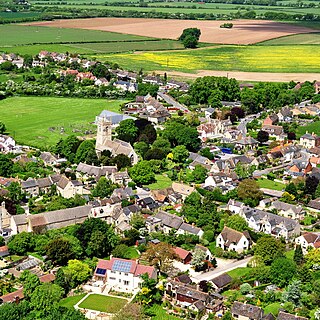
Oxfordshire is a ceremonial county in South East England. The county is bordered by Northamptonshire and Warwickshire to the north, Buckinghamshire to the east, Berkshire to the south, and Wiltshire and Gloucestershire to the west. The city of Oxford is the largest settlement and county town.

Bisham Abbey is a Grade I listed manor house at Bisham in the English county of Berkshire. The name is taken from the now lost monastery which once stood alongside. This original Bisham Abbey was previously named Bisham Priory, and was the traditional resting place of many Earls of Salisbury. The complex surrounding the extant manorial buildings is now one of three National Sports Centres run on behalf of Sport England and is used as a residential training camp base for athletes and teams and community groups alike. It is a wedding venue with a licence for civil ceremony and is used for conferences, team building events, corporate parties and private functions.

Thame is a market town and civil parish in Oxfordshire, about 13 miles (21 km) east of the city of Oxford and 10 miles (16 km) southwest of Aylesbury. It derives its name from the River Thame which flows along the north side of the town and forms part of the county border with Buckinghamshire. The parish includes the hamlet of Moreton south of the town. The 2011 Census recorded the parish's population as 11,561. Thame was founded in the Anglo-Saxon era and was in the kingdom of Wessex.

Lesnes Abbey is a former abbey, now ruined, in Abbey Wood, in the London Borough of Bexley, southeast London, England. It is a scheduled monument, and the abbey's ruins are listed at Grade II by Historic England.
Sopwell Priory was a Benedictine nunnery founded around 1140 on the site of an ancient hermitage in Sopwell, Hertfordshire, England. After the Dissolution, the priory was torn down and a Tudor manor house constructed in its place.
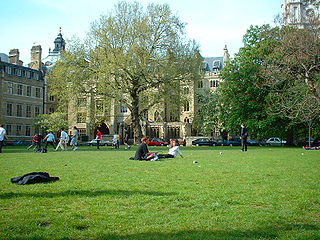
Dean's Yard, Westminster, comprises most of the remaining precincts of the historically greater scope of the monastery or abbey of Westminster, not occupied by its buildings. It is known to members of Westminster School as Green. It is a large gated quadrangle, closed to public traffic, chiefly a green upon which the pupils have the long-use acquired exclusive rights to sit, read and to play games such as football. For some centuries until a point in the early seventeenth century it was a third of its present size, since to the south stood the Queen's Scholars' dormitory, which was in monastic times the granary. Its stones support Church House.

Halesowen Abbey was a Premonstratensian abbey in Halesowen, England of which only ruins remain. Founded by Peter des Roches with a grant of land from King John, the abbey's official year of inauguration was 1218. It acquired two daughter abbeys and a dependent priory. It also acquired a considerable range of estates, mostly concentrated within the region, and a number of churches, which it appropriated after being granted the advowsons. The abbey's manorial court records have survived in large part, portraying a discontented community, driven to many acts of resistance and at one point to challenge the abbey's very existence. The abbey played no great part in the affairs of its order, although it was represented at all levels. At least one abbot attracted serious criticism from within the order, which attempted to remove him. Its canons observed the Rule of St Augustine to a varying degree, with some serious lapses, at least in the late 15th century, when the order's visitor uncovered widespread sexual exploitation of local women. The abbey was moderately prosperous and survived the suppression of the lesser monasteries. It was dissolved in 1538.

Thame United Football Club are a football club based in Thame, Oxfordshire, England. They were established in 1883 and joined the Hellenic League in 1959. The club currently competes in the Southern League Division One Central.

Burnham Abbey was a house of Augustinian canonesses regular near Burnham in Buckinghamshire, England. It was founded in 1266 by Richard, 1st Earl of Cornwall. The abbey of St Mary consisted of around twenty nuns at the outset, but was never wealthy and by the time of its dissolution in 1539 there were only ten.

Lesnes Abbey is a former abbey, now ruined, in Abbey Wood, in the London Borough of Bexley, southeast London, England. It is a scheduled monument, and the abbey's ruins are listed at Grade II by Historic England.

Coggeshall Abbey, situated south of the town of Coggeshall in Essex, was founded in 1140 by King Stephen of England and Matilda of Boulogne, as a Savigniac house but became Cistercian in 1147 upon the absorption of the order.

The King's Weigh House was the name of a Congregational church congregation in London. Its Victorian church building in Mayfair is now the Ukrainian Catholic Cathedral of the Holy Family in Exile.

Prinknash Abbey is a Roman Catholic monastery in the Vale of Gloucester in the Diocese of Clifton, near the village of Cranham. It belongs to the English Province of the Subiaco Cassinese Congregation, which is itself part of the worldwide Benedictine Confederation. It is noted for its manufacturing of incense.

Bayworth is a hamlet in the civil parish of Sunningwell about 3 miles (5 km) south of Oxford. Bayworth was part of Berkshire until the 1974 boundary changes transferred it to Oxfordshire.
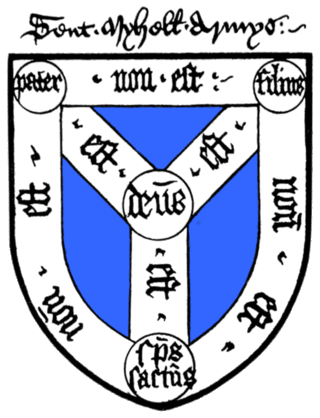
The Holy Trinity Priory, also known as Christchurch Aldgate, was a priory of Austin canons founded around 1108 by the English queen Matilda of Scotland near Aldgate in London.

Culham Manor is a historic manor house in Culham, near Abingdon in southern Oxfordshire, England.
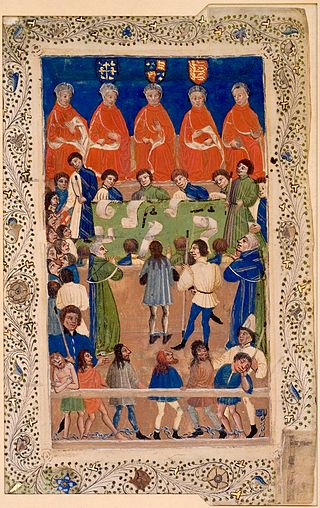
The Court of King's Bench, formally known as The Court of the King Before the King Himself, was a court of common law in the English legal system. Created in the late 12th to early 13th century from the curia regis, the King's Bench initially followed the monarch on his travels. The King's Bench finally joined the Court of Common Pleas and Exchequer of Pleas in Westminster Hall in 1318, making its last travels in 1421. The King's Bench was merged into the High Court of Justice by the Supreme Court of Judicature Act 1873, after which point the King's Bench was a division within the High Court. The King's Bench was staffed by one Chief Justice and usually three Puisne Justices.
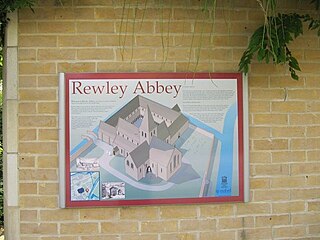
The Cistercian Abbey of Rewley was an abbey in Oxford, England. It was founded in the 13th century by Edmund, 2nd Earl of Cornwall. Edmund's father, Richard, 1st Earl of Cornwall, founder of Hailes Abbey, had intended to establish a college or chantry of three secular priests to pray for his soul, but his son Edmund substituted 'six Cistercian monks, having more confidence in them'. If this was the original plan, it was soon enlarged. In 1280 he offered the general chapter of the Cistercian order to found a college (studium) for Cistercians at Oxford, and the chapter accepted the offer, and decreed that the college should have the same privileges as the college of St. Bernard at Paris, and that it should be under the Abbot of Thame, as the other was under the Abbot of Clairvaux. The following year the chapter decreed 'out of due respect to the Earl of Cornwall' that the Abbot of Thame should be empowered to appoint an Abbot of his own choice for the house of study at Oxford, and that there should be a daily memory of the late Earl of Cornwall at Mass at the college (studium) of Oxford, according as the Abbot of the place shall ordain.
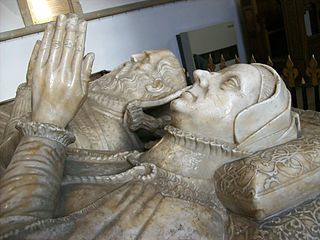
John Williams, 1st Baron Williams of Thame was Master of the Jewels and Lord President of the Council of the Welsh Marches. He was summoned to parliament as Lord Williams of Thame on 17 February 1554.
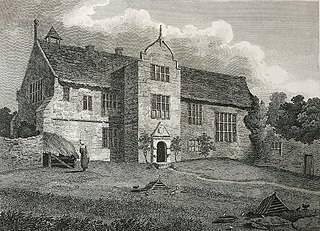
Combwell Priory was a priory near Bedgebury Cross about 10 miles southeast of Tunbridge Wells in Kent, England.
References
- ↑ "Thame Park". Thame Local History. Retrieved 8 October 2024.
- ↑ "Thame Park". Parks & Gardens. Retrieved 8 October 2024.
- ↑ Plea Rolls of the Court of Common Pleas; Michaelmas Term, 1460: first entry: (in Latin). Richard Lyndesey, of Thame, Oxon, abbot of the monastery of the BVM, as second defendant
51°43′40″N0°57′48″W / 51.727916°N 0.963279°W